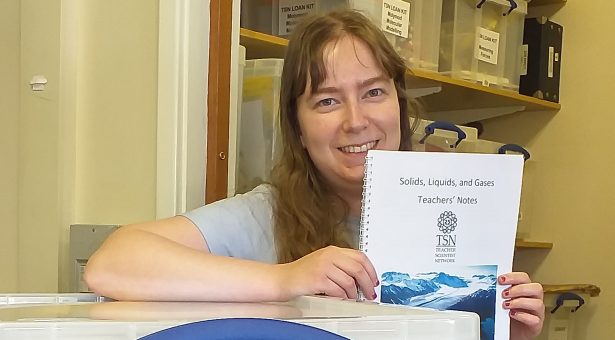Rebecca seizes the opportunity of placement with the Teacher Scientist Network

Rebecca Casson, a student at the JIC, met with Phil Smith, from the Teacher Scientist Network (TSN) during one of break-out sessions at the PIPS Employer Forum and felt that TSN could provide her with a good placement experience. Rebecca had already undertaken outreach in schools, but often using pre-provided materials and activities and she wanted to gain some insight into the development of activities for outreach.
Rebecca undertook her placement during her second year, which she found to be excellent timing as the placement coincided with a natural pause in her PhD project. Taking the placement at this point didn’t interrupt anything and allowed her to return to PhD work with a fresh perspective. Unfortunately, the lock down due to the COVID-19 pandemic also happened just a couple of weeks after beginning her placement so Rebecca had to adapt quickly to move to working from home. This presented its own set of challenges as Rebecca was trialling experiments her kitchen! Fortunately she had hit the ground running with her placement activity and was able to make this transition relatively smoothly, maintaining contact with her supervisor via email and Zoom.
During the placement, Rebecca took responsibility for the project of developing the entire kit box, having a real sense of ownership over it and following it through to completion, which she found especially valuable. As a result of the placement, Rebecca developed a new chemistry-related ‘kit box’ focusing on solids, liquids, and gases for use in primary schools, along with a full set of supporting documents for teachers (www.tsn.org.uk/KitClub.htm ). The downside of lockdown was that due to schools being closed, the kit wasn’t able to be tested before the placement ended, so it wasn’t possible to judge how successful it was.
Rebecca also wrote her first ever grant proposal, which was a particular challenge but one she found interesting. “As I had never worked on a grant application before, this gave me significant insight and experience of the process of securing funding through a competitive process”, says Rebecca.
Seeing a whole project through over the smaller timescale of PIPS has helped Rebecca reflect on the progress she has made on her own PhD and evaluate what needs to be done in the remaining two years of her postgraduate study. This has helped her return to study with increased confidence in her work and an improved personal organisation which will be valuable for the remainder of her PhD.
From the host’s perspective, as well as gaining a box for the Kit Club, Phil was delighted to see Rebecca’s personal development and growth in confidence (which could easily have gone the other way under the challenging working circumstances).
Rebecca developed many other skills, including creativity, problem solving, communication and presentation skills and team working. Rebecca had to ensure that the content she produced was easy to follow and understand, considering that the target audience was teachers of key stage 2 classrooms, who are not usually scientific experts. Rebecca’s PIPS has reinforced the notion of how important outreach and science communication are to the modern researcher, and this is something she will take with her going forwards.
Rebecca found the three months to be a very positive experience, providing benefits for both her training and skills development and her research project. “Your PIPS is a great opportunity to take a break from your PhD, learn new skills, and gain a new perspective. So devote yourself to it, open your mind to new experiences, and make full use of every chance to gain skills and experience that you get”, reflects Rebecca. “Instead of seeing PIPS as time away from your PhD, view it as a time separate to, but an important part of, your studies”.
